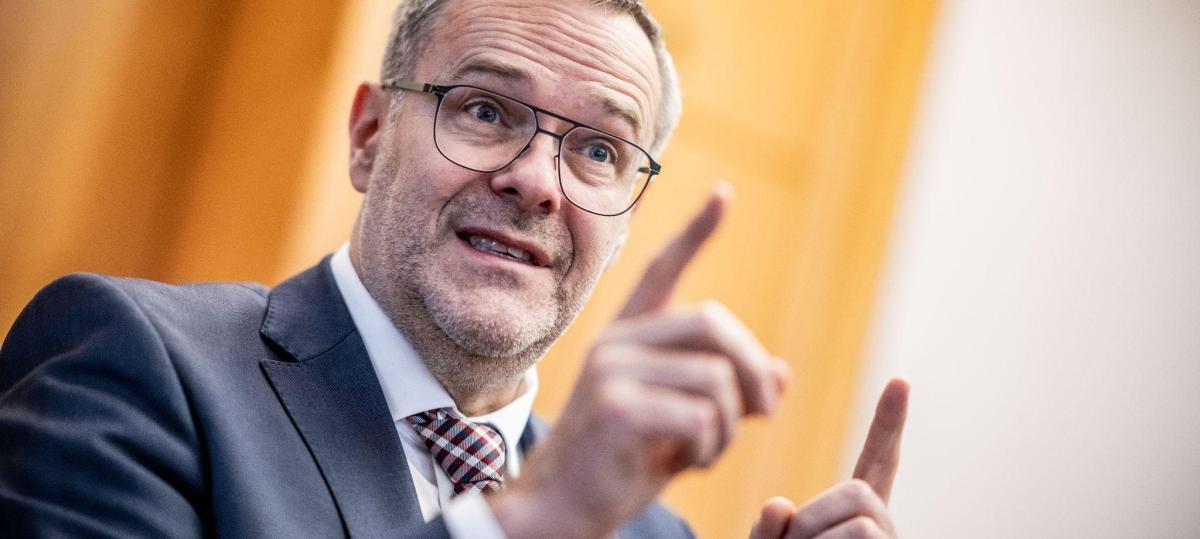This is what Dittrich says about plans from Union and SPD

Mr. Dittrich, you asked for resolved signals before the election of politics. Now you get at least two billions of billions of special funds. This is not a question of the infrastructure, but actually your industry also benefits from the special fund of the Bundeswehr?
Jörg Dittrich: I believe that many are not aware of how deep the German craft In many supply chains is integrated. And I definitely speak not only of catering for the advice of the armaments companies, but of the supply that also takes place for industry. If such a large amount of money comes into the economic cycle, it definitely has an impact on the craft.
Do you have enough people and sufficient material to renovate kindergartens, to renovate bridges, and what may be on the order slip soon?
Dittrich: We assume that more than 200,000 jobs in the craft are currently not occupied. We are at the beginning of the wave that the baby boomers in pension go. There will be bottlenecks not only in the craft, but in all sectors of the economy. We have to counteract the fields of all us. Even if all problems in the world were disappearing that would remain the topic of skilled workers. But experiences-for example in the expansion of photovoltaics, in which many initially feared that there were too few specialists-have shown that if planning security exists and the ride of investments is organized wisely, this is to be led down and the required capacity is found.
You and the ZDH have been complaining about an excessive bureaucracy for many years. Has there been any noticeable or is the braking effect still high?
Dittrich: The bureaucratiumE has become such a powerful octopus that it can lead to state failure. We would have to absorb speed quickly to implement the goals associated with the special funds. But the extent of bureaucracy, which companies are currently looking forward to, does not allow this.
Please give an example.
Dittrich: Take a butcher's shop that wants to re -tile your rooms. It follows from occupational safety that the tiles have a certain slip resistance and must therefore be rough. Food control also requires particularly smooth tiles so that no germs form. So you will get trouble with one of the two authorities.
Each business association was allowed Robert Habeck named the ten most idiotic bureaucratic regulations, the Minister of Economy promised that he was doing something. Little came out in the end. Has Habeck lacked the punch?
Dittrich: The reduction in bureaucracy is not just on a ministry. But yes, the results are poor across all areas. We have to get much faster. If we do not succeed, the distance to other countries will become even greater. There was a time when we were at the Gross domestic product per capita At a height with the USA. That was a long time ago.
Friedrich Merz wants to create a separate Digital Ministry, among other things. And a Minister of State for Sport and Volunteering. Would it make sense to look at the subject of bureaucracy in a similar way? Or even goes as far as it happened in the United States, where Elon Musk wants to reduce a lot and thus also bureaucracy?
Dittrich: Bureaucratic reduction always sounds nice, but if it is done seriously, this is painful. There would be less control and the inspectors would need a different task. As far as Elon Musk is concerned – I cannot imagine an individual person for it for our democracy. However, there are already institutions to which you can give more rights to seriously under control the bureaucracy. For example, I am thinking of the standard control council.
After the election, the east was colored blue. There were particularly many people there who chose the AfD. Did she surprise this election behavior?
Dittrich: The Strong from partyn On the right like the left edge, which give populist answers to political challenges, get me. However, it would draw a look in the wrong direction if we dismiss it as a purely East German topic. It has arrived in the west as well. This populist wave generally worries me because populism is looking for a guilty and thinks that the solution is in disruption. However, populist demands such as the expropriation of companies, leaving the European Union or the abolition of the euro certainly do not lead to Germany's wealth.
What should change?
Dittrich: The welfare state must protect people who are not doing well. But I clearly see that there are many people who want to see their performance recognized. This has to be put into focus. Just one more of the old recipe will not convince people.
We are the third largest economy on earth. Actually a great thing. But that is not recognized.
Dittrich: We play In the Champions LeaguE, but we are not playing for victory at the moment. And for a country that was used to being at the top in the Champions League, the mediocre is a feeling of descending. And it is also a real one if we don't counteract. There is not enough framework. Fortunately, there are also positive developments.
For example?
Dittrich: Well, the one I already mentioned Photovoltaic expansion For example: First of all, it was said that tens of thousands of workers would be missing. In the end, photovoltaics in the extension have landed on expectations. This shows that the social market economy is looking for and finds solutions. This requires political reliability and stability.
The old government had decided with the specialist immigration law at least on paper so that more qualified people from abroad can come to Germany. The craft had repeatedly challenged this. Has that been fertile so far?
Dittrich: In fact, there are initial positive developments. So they are Visa processing times Last time, people come into the country faster. The Immigration Act was a very important step. We have to continue to go on this path and continue to look for potentials, because even if it is possible to raise all domestic reserves, we will not do without a controlled immigration into our work system. Not even if we increase productivity. Nevertheless, we will need people who are ready to work here.
In connection with the international craft fair and the Future Handwerk congress on Wednesday, the top discussion of the German economy will take place again on March 14th. Olaf Scholz comes. What else is there to discuss with a chancellor?
Dittrich: As an organization, we do everything we can to the fact that the future crafts and that of it for a hotspot of the craft, yes to the Wacken of the craft. We want young people with influencers and innovative companies to meet, exchange ideas and take a positive mood with us. We offer many different formats for this. The company should know that the craft does not meet for a song, but is bursting with strength and giving impulses into society and in politics.
That was the advertising block. And what about Mr. Scholz?
Dittrich: It requires respect for the office and the structures that we the Chancellor like to visit and talk to him. And of course there is also a need for conversation and information- in an extremely difficult situation with an extremely difficult situation. So we are interested in which conclusions Mr. Scholz from three years of chancellorship draws. We will also talk to the upcoming responsibilities about this. Friedrich Merz plans to come to Munich too.
To person
Jörg Dittrich has been President of the Central Association of German Crafts (ZDH) since the beginning of 2023. Dittrich was born on August 1, 1969 in Dresden. He trained as a roofer and became a civil engineer/dipl.-Ing. (FH) for building construction. Then he made his master and completed a part -time study of wood protection experts. He is married and has six children. The ZDH represents the interests of one million craft businesses with more than 5.57 million employees and 360,000 trainees.







